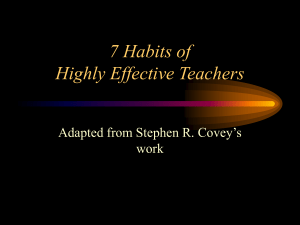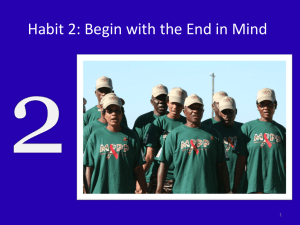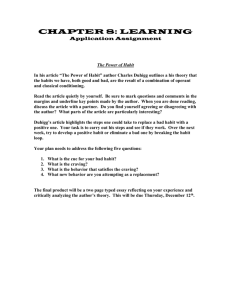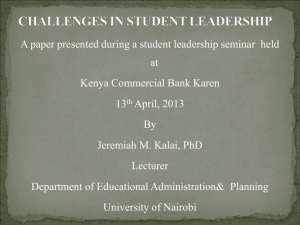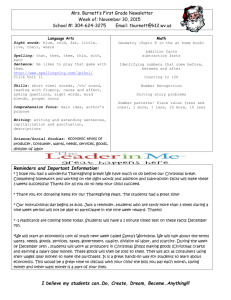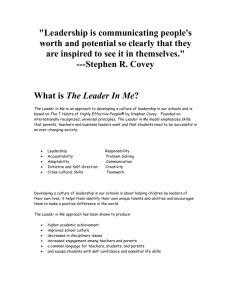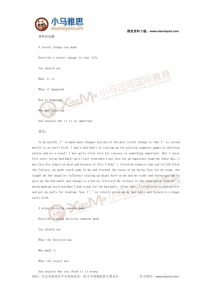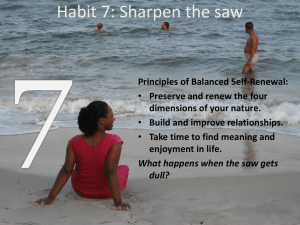AUGUSTA STATE UNIVERSITY College of Education Department of
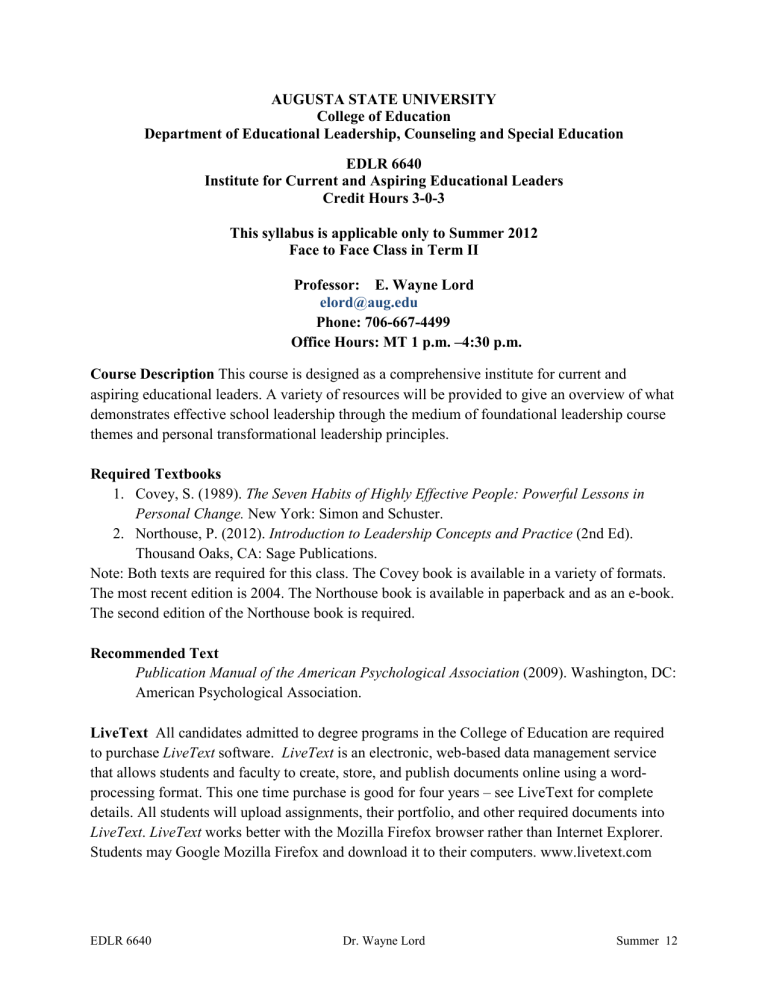
AUGUSTA STATE UNIVERSITY
College of Education
Department of Educational Leadership, Counseling and Special Education
EDLR 6640
Institute for Current and Aspiring Educational Leaders
Credit Hours 3-0-3
This syllabus is applicable only to Summer 2012
Face to Face Class in Term II
Professor: E. Wayne Lord elord@aug.edu
Phone: 706-667-4499
Office Hours: MT 1 p.m. –4:30 p.m.
Course Description This course is designed as a comprehensive institute for current and aspiring educational leaders. A variety of resources will be provided to give an overview of what demonstrates effective school leadership through the medium of foundational leadership course themes and personal transformational leadership principles.
Required Textbooks
1.
Covey, S. (1989). The Seven Habits of Highly Effective People: Powerful Lessons in
Personal Change.
New York: Simon and Schuster.
2.
Northouse, P. (2012). Introduction to Leadership Concepts and Practice (2nd Ed).
Thousand Oaks, CA: Sage Publications.
Note: Both texts are required for this class. The Covey book is available in a variety of formats.
The most recent edition is 2004. The Northouse book is available in paperback and as an e-book.
The second edition of the Northouse book is required.
Recommended Text
Publication Manual of the American Psychological Association (2009). Washington, DC:
American Psychological Association.
LiveText All candidates admitted to degree programs in the College of Education are required to purchase LiveText software. LiveText is an electronic, web-based data management service that allows students and faculty to create, store, and publish documents online using a wordprocessing format. This one time purchase is good for four years – see LiveText for complete details. All students will upload assignments, their portfolio, and other required documents into
LiveText . LiveText works better with the Mozilla Firefox browser rather than Internet Explorer.
Students may Google Mozilla Firefox and download it to their computers. www.livetext.com
EDLR 6640 Dr. Wayne Lord Summer 12
College of Education Conceptual Framework
The preparation of teachers and other school personnel is critical to all other professions, and to communities, the state, and the nation. The professional educator plays an essential role in student learning. The Conceptual Framework of the professional education unit at Augusta State
University consists of a mission and vision with an overarching theme to produce prepared , able, and responsive professionals to teach and support diverse learners.
This mission and vision requires a partnership between the professional education unit including the College of Education, the College of Arts and Sciences, the local community educational system, community agencies, and the Professional Development School Network.
Conceptual Framework: Mission
Our mission is to educate prospective school professionals to be knowledgeable, effective, and ethical practitioners.
Conceptual Framework: Vision
Our vision is to prepare school professionals who transform P-12 learners into thinking, productive citizens.
Standard: Prepared
Disposition: To think critically about the process of teaching, learning and assessment.
Competencies: Candidates who are prepared will :
P1 - demonstrate strong content and pedagogical preparation in their respective
subject area or professional field.
P2 - use self assessment and analysis as a basis for collaboration with
colleagues, continuing professional development and lifelong learning.
P3- possess an understanding of the central concepts, tools of inquiry, and structures
of the discipline(s) or professional field of study and create learning
experiences that enable all students to learn.
P4- demonstrate an understanding about how students learn and develop
(intellectually, socially, and individually) and provide developmentally
appropriate curricula, learning opportunities and support.
P5- demonstrate knowledge about how to use information and technology effectively to foster active inquiry, collaboration, and supportive interaction in educational settings.
Standard: Able
EDLR 6640 Dr. Wayne Lord Summer 12
Dispositions: To be creative, challenging, and flexible in teaching/professional practices.
Competencies: Candidates who are able will :
A1 - understand, use, and support a variety of instructional strategies to encourage critical
and creative thinking, problem solving, and achievement.
A2- create a learning environment that encourages positive social interaction, active
engagement in learning, and self-motivation for all learners.
A3- plan, guide, and support instruction using knowledge of subject matter, the learners,
the community, and curriculum goals.
A4- understand and use authentic assessment to evaluate and ensure the continuous
development of the learner.
A5- organize, allocate, and manage resources to support learning.
Standard: Responsive
Disposition: To act in a manner that is empathetic, responsive, enthusiastic, inclusive, and reflective in relations with students, parents, peers, and others.
Competencies: Candidates who are responsive will:
R1- respect the dignity of all persons believing that all children can learn and have the right to an opportunity to do so.
R2- translate knowledge into creating and supporting meaningful experiences for diverse
learners.
R3-accept responsibility for teaching and working in authentic settings with diverse populations of learners.
R4- demonstrate a commitment to meet the educational needs of learners in a fair, caring, nondiscriminatory, and equitable manner.
R5 reflect on practice and continually evaluate the effects of choices and actions on others (students, parents, and other professionals in the learning community).
R6- foster professional relationships with school colleagues, parents, and agencies in the larger community to support the learning and well-being of all students.
All Georgia PSC and ELCC Standards for Educational Leadership are addressed in this course.
Course Objectives The Educational Leadership program’s goals and objectives are focused on the knowledge, skills, and dispositions candidates need to lead educational enterprises centered on teaching and learning. To that end, course content includes three dimensions: (1) Awareness, defined as acquiring concepts, information, definitions, and procedures; (2) Understanding , defined as interpreting knowledge to school environments, integrating concepts with practice, and using knowledge and skills in context; and (3) Capability , defined as applying knowledge and skills to specific problems of practice (ELCC).
EDLR 6640 Dr. Wayne Lord Summer 12
The Candidate will:
1.
Explain the seven habits of highly effective people and apply these to being an educational leader
2.
Discuss leadership from theoretical, conceptual, and personal perspectives
3.
Complete self-assessments to understand his or her individual leadership style
4.
Identify attributes of effective leaders
5.
Analyze the ELCC Standards to identify the knowledge, skills, and dispositions required of educational leaders
Course Schedule: This course is organized into 5 class meetings during Summer Term II
(2012). Attendance and full participation in each class is expected.
COURSE SCHEDULE
Class One Work May 15, 2012
Jigsaw and Discuss Covey Paradigms and Principles
Read and Discuss Northouse Being a Leader; and Recognizing Your Traits
Complete 1.1 Conceptualizing Leadership Questionnaire and Observational
Exercise 1.2 Page 11-13 and Leadership Traits Questionnaire 2.1 page 39-40
Written Assignment(s) due prior to noon on Monday, May 21, 2012
1.
Write a personal narrative that responds to these questions: Who are you? Where have you been? Where are you now? Where are you going? Is leadership something everyone can learn to do, or do you think it is a natural innate ability for a few?
Explain your position on this question.
2.
Complete Observational Exercise 1.2 in Northouse. Prepare a paper in APA style that summarizes your interview findings and responds to the four questions posed.
Readings to be completed prior to Class Two
1.
Covey Read Habit One Be Proactive and Habit Two Begin with the End in Mind
2.
Northouse Read Recognizing Your Philosophy and Style of Leadership and
Attending to Tasks and Relationships (IMPORTANT NOTE: Complete 3.1
Leadership Styles Questionnaire and 4.1 Task and Relationship Questionnaire
BEFORE READING the chapters.)
3.
View Video Link 3.1, 3.2, 3.3, 4.1, 4.2,
4.
Discussion on Journal Link 3.1 assigned to
5.
Discussion on Encyclopedia Link 3.1 assigned to
6.
Discussion of Encyclopedia Link 3.2 assigned to
7.
Discussion of Journal Link 4.1 assigned to
8.
Discussion of Journal Link 4.2 assigned to
9.
Discussion of Encyclopedia Link 2.1 assigned to
EDLR 6640 Dr. Wayne Lord Summer 12
Class Two Work May 22
Discuss Covey Habit One and Habit Two
Discuss Northouse Recognizing Your Philosophy and Style of Leadership; Attending to
Tasks and Relationships
Written Assignment(s) due prior to noon on Monday, May 28, 2012
1.
Complete 4-5 page written reflection paper on Habit One and Habit Two
2.
Complete Observational Exercise 3.2 in Northouse. Prepare a paper in APA style that summarizes your interview findings and responds to the four questions posed.
Readings to be completed prior to class three
1.
Covey Habit Three Put First Things First and Habit Four Think Win/Win
2.
Northouse Developing Leadership Skills, Creating a Vision, Setting the Tone
(IMPORTANT NOTE: Complete 5.1 Leadership Styles Questionnaire , 6.1
Leadership Vision Questionnaire, and 7.1 Setting the Tone Questionnaire BEFORE
READING the chapters.)
3.
View Video Link 5.1, 5.2, 5.3, 6.1, 6.2, 6.3, 7.1, 7.2,
4.
Journal Link 5.1 assigned to
5.
Journal Link 5.2 assigned to
6.
Journal Link 6.1. assigned to
7.
Journal Link 6.2 assigned to
8.
Journal Link 7.1 assigned to
9.
Encyclopedia Link 7.1 assigned to
Class Three May 29
Discuss Covey Habit Three and Habit Four
Discuss Northouse Readings
Written Assignment(s) due prior at class four
1.
Complete 4-5 page written reflection paper on Habit Three and Habit Four
2.
Complete Observational Exercise 6.2 in Northouse. Prepare a paper in APA style that summarizes your interview findings and responds to the four questions posed.
Readings to be completed prior to class four
1.
Covey Habit Five Seek First to Understand, Then to Be Understood and Habit Six
Synergize
2.
Northouse Listening to Out-Group Members, Handling Conflict, Overcoming
Obstacles (IMPORTANT NOTE: Complete 8.1 Responding to Members of the
EDLR 6640 Dr. Wayne Lord Summer 12
Out-Group Questionnaire , 9.1 Conflict Style Questionnaire, and 10.1 Path Goal
Questionnaire BEFORE READING the chapters.)
3.
View Video Link 8.1, 9.1, 9.2, 9.3, 9.4, 10.1, 10.2, 10.3
4.
Journal Link 8.1 and 8.2 assigned to
5.
Handbook Link 8.1 assigned to
6.
Encyclopedia Link 8.1 assigned to
7.
Journal Link 9.1 and 9.2 assigned to
8.
Journal Link 10.1 assigned to
9.
Handbook Link 9.1 and Encyclopedia Link 10.1 assigned to
Class Four June 5
Discuss Covey Habit Five and Habit Six
Discuss Northouse Readings
Written Assignment(s) due prior at class five
1.
Complete 4-5 page written reflection paper on Habit Five and Habit Six
2.
Complete Observational Exercise 8.2 . 9.2 or 10.2 in Northouse. Prepare a paper in
APA style that summarizes your observational findings and responds to the four questions posed.
Readings to be completed prior to class five
1.
Covey Habit Seven Sharpen the Saw and Inside-Out Again
2.
Northouse Addressing Ethics in Leadership (IMPORTANT NOTE: Complete 11.1
Core Values Questionnaire BEFORE READING the chapter.)
3.
Journal Link 11.1 assigned to ……and ……
4.
Handbook Link 11.2 assigned to …… and ……
5.
Journal Link 11.2 assigned to ……and …….
Class 5 June 12
Discuss Covey Read Habit Seven
Discuss Northouse Readings
Five minute individual presentation of major course assignment
Written Assignment(s) due by noon on June 18, 2012
Complete 2-3 page written reflection on Habit 7
Major course assignment paper due by noon June 18, 2012.
MAJOR COURSE ASSIGNMENT
In a paper (8-10 pages suggested length) written in APA style, discuss your assigned
Georgia PSC Educational Leadership Standard explaining the knowledge, skills, and dispositions that are implicit and explicit in the standards. Explain how Covey’s work and
EDLR 6640 Dr. Wayne Lord Summer 12
Northouse readings would affect a school leader’s practice for leading your assigned standard. You should discuss your assigned standard with your coach to seek understanding from the perspective of an experienced leader. This conversation should contribute to analyzing your assigned standard from a leadership perspective. Your task is to synthesize the course readings and specifically address those readings relate to and inform the leadership of the standard. You will present a five minute presentation at the last class and respond to questions from the class.
SCORING OF PERFORMANCE-BASED EXERCISES
CRITERIA UNSATISFACTORY IN PROGRESS PROFICIENT EXEMPLARY
Response to assignment prompt
The candidate’s presentation DOES
NOT demonstrate knowledge and ability essential for leadership and has significant omissions to the assignment prompt.
There is no evidence of critical thinking or reflection.
The candidate’s presentation shows a
DEVELOPING knowledge and ability essential for leadership.
There is little evidence of critical thinking or reflection.
The candidate’s presentation
MEETS expectations and shows knowledge and ability essential for leadership.
The candidate’s presentation
EXCEEDS expectations and shows knowledge and ability essential for leadership.
The candidate makes limited connection to assigned readings.
Some evidence and artifacts are incomplete.
There is some evidence of critical thinking and synthesis of readings, observations, or interviews.
Evidence and artifacts are complete.
There is strong evidence of analytical, critical thinking with numerous examples of synthesis of readings and class discussions.
The candidate presents original and creative insight.
Evidence and artifacts are complete and presented in a
EDLR 6640 Dr. Wayne Lord Summer 12
Writing There are four or more writing and/or style errors.
There are two or three writing and/or style errors.
There is only one writing or style error.
professional manner.
There are no writing or style errors.
SCORING/GRADING
Class Attendance and Discussion 50 points (10 points per class0
Personal Narrative 10 points
Observational Exercise 1.2 20 points
Reflection Paper Habit 1 and 2 20 points
Observational Exercise 3.2 20 points
Reflection Paper Habit 3 and 4 20 points
Observational Exercise 6.2 20 points
Reflection Paper Habit 5 and 6 20 points
Observational Exercise 20 points
8.2 or 9.2. or 10.2
Reflection Paper Habit 7
Oral Presentation last class
Major Paper
A= 295-268 points
B= 267-236 points
C= 235-206 points
D= 205-175 points
F=174 points or less
20 points
25 points
50 points
APA Style
When required, written work is to follow the American Psychological Association (APA) style manual, sixth edition (2010). APA style addresses the mechanics of writing as well as the format for citation of references.
Assignments
Assignments will not be accepted after the due date and will not be graded (i.e., the grade will be zero).
EDLR 6640 Dr. Wayne Lord Summer 12
Academic Honesty
Students are expected to read and strictly adhere to the entire Academic Honesty policy found in the 2011-2012 Augusta State University Catalog . In part, the policy reads:
Academic honesty requires the presentation for evaluation and credit of one’s own work, not the work of others…Plagiarism is the failure to acknowledge indebtedness. It is always assumed that the written work offered for evaluation and credit is the student’s own unless otherwise acknowledged. Such acknowledgement should occur whenever one quotes another person’s actual works, whenever one appropriates another person’s ideas, opinions, or theories, even if they are paraphrased, and whenever one borrows facts, statistics, or other illustrative materials unless the information is common knowledge.
MyASU Account
MyASU is a web based portal that contains a variety of information and services. A MyASU account is created for all new applicants and stays with the student throughout their time at ASU and after graduation. MyASU gives you
•
•
•
•
•
Access to JagMail (web-based Email system)
Classroom tools such as class bulletin boards and class chat rooms
Campus & Personal Announcements
Access into ELROY (your personal student information)
Access to GeorgiaVIEW Vista (An On-Line Course management system)
Students are encouraged to check their JagMail account daily. Students are responsible for any assignments or deadlines sent to them via JagMail. If you have trouble accessing your myASU account, you should contact Information Technology Services at (706) 737-1676.
Computers and printers are available free of charge in computer labs throughout campus as well as the library and campus Internet cafes for students who do not have access from a home computer.
Department of Educational Leadership, Counseling and Special Education
Website Students are invited to visit the departmental website at: http://www.aug.edu/clinical A variety of forms, some interactive, may be downloaded from the website. There are also newsletters, registration information and announcements which students will find useful. Most forms are in Adobe Acrobat.
All campus computers have Adobe Acrobat Reader installed and students can download Adobe Acrobat Reader for their home computer at no charge from: http://www.adobe.com/products/acrobat/
EDLR 6640 Dr. Wayne Lord Summer 12
Writing Center
You may contact the ASU Writing Center (1-706-737-1402) for help with developing and improving composition skills. If you would like additional help with writing or with learning
APA style, inform the course instructor.
Candidates with Disabilities
Candidates with disabilities must meet with the Office of Disability Services in order to arrange for accommodations. Once the candidate has arranged for an accommodation letter from the Office of Disability Services, it is the candidate’s responsibility to schedule an appointment with his or her instructor within two weeks in order to discuss accommodations. If the candidate does not initiate this meeting, it is assumed no special accommodations or modifications will be necessary to meet the requirements of this course. You may make an appointment with Testing and Disability Services by calling (706) 737-1469 or by visiting their office located in Galloway
Hall.
Candidate Safety
Candidate safety is of primary importance. When leaving classes late in the evening, you are encouraged to stay in groups of two or more and to report all suspicious behavior or persons to the ASU Office of Public Safety (emergency number 706-729-2911; non-emergency 706-737-
1401). Emergency telephones are located in the University Hall parking lot and various other locations on campus.
Cell Phones
The use of cell phones for calls, text messaging, or other tasks is prohibited in class.
Bibliography
Collins, J. (2001). Good to great. New York: HarperCollins.
Collins, J. (2005). Good to great and the social sectors. Boulder, CO: Jim Collins.
Covey, S. R. (1989). Seven habits of highly effective people . New York: Simon & Schuster.
Covey, S. R., Merrill, A.R., & Merrill, R.R. (1995). First things first . New York: Fireside.
Covey, S. R. (2004). The 8 th
habit: From effectiveness to greatness. New York: Free Press.
Fisher, R. & Ury, W. (1981). Getting to yes . Boston: Houghton Mifflin.
Fullan, M. G. (2003). The moral imperative of school leadership. Thousand Oaks, CA: Corwin
Press.
Fullan, M. G. (1991). The new meaning of educational change. New York: Teachers College
Press.
Hersey, P. (1984). The situational leader . New York: Warner Books.
Johnson, C.E. (2012). Meeting the ethical challenges of leadership: Casting light or shadow .
Thousand Oaks, CA: Sage.
Kouzes, J. M. & Posner, B.Z. (2008). A leader’s legacy.
San Francisco: Jossey-Bass.
EDLR 6640 Dr. Wayne Lord Summer 12
Kouzes, J.M. & Posner, B.Z. (2007) The leadership challenge . San Francisco: Jossey-Bass.
Naisbitt, J. (2006). Mind set!
New York: HarperCollins.
Naisbitt, J. & Aburdene, P. (1985). Re-inventing the corporation . New York: Warner Books.
Peters, T. J. & Waterman, R. H., Jr. (1982). In search of excellence . New York: Harper and
Row.
Peters, T. J. & Austin, N. (1985). A passion for excellence . New York: Harper and Row.
Sergiovanni, T. J. (2007). Rethinking leadership. Thousand Oaks, CA: Corwin Press.
Sergiovanni, T. J. (2005). Strengthening the heartbeat: Leading and learning together in schools.
San Francisco: Jossey-Bass.
Snoook, S., Nohria, N., & Khurana, R. (2012). The handbook for teaching leadership: Knowing, doing, and being . Thousand Oaks, CA: Sage.
The Arbinger Institute. (2000). Leadership and self-deception. San Francisco: Berrett-Koehler.
Ury, W. (1993). Getting past no: Negotiating your way from confrontation to cooperation.
NewYork: Bantam Books.
EDLR 6640 Dr. Wayne Lord Summer 12
